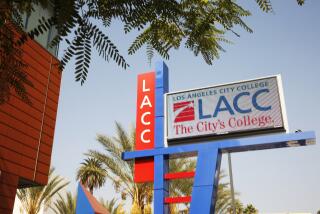Writing a Surprising Chapter in University’s History
- Share via
ORANGE — Not long ago, Chapman University was the kid snoozing in the lecture hall, unmotivated and without prospects.
If anyone outside Orange County had heard of Chapman, it was usually because of its World Campus Afloat, a cruise ship that used to take students on semester-long trips. But the ship was let go in the 1970s to help pay debts.
Without much of an academic reputation and with little money in the bank, Chapman made what was probably the biggest decision of its life: It would aspire not just to survival, but to excellence.
The little college in the middle of Orange embarked on a program of self-improvement so ambitious that it has surprised even itself. Guided by its business-minded president’s calculated, sometimes controversial plan, it worked through the ‘90s to make itself a school that people would think of, if not first, then certainly not last.
Today it has $101 million in the bank, half a dozen new buildings, 28 endowed faculty positions--in everything from entrepreneurship to Holocaust studies--and attracts students for academics, not cruises.
Most of the credit, say observers inside and outside the university, goes to the leadership, public relations savvy and fund-raising ability generated by the partnership of two men: James Doti, Chapman’s president since 1991, and a loyal alumnus, Orange County multimillionaire developer George Argyros.
Doti, 54, who trained at the University of Chicago under Nobel Prize winners Milton Friedman and George Stigler, took office with an economist’s analytical eye. He raised tuition, so an education at Chapman would feel as if it were worth more. He took money earmarked to attract athletes and used it instead to recruit brains. He pushed the school into specialty areas--film and law and, most recently, high-tech--that would appeal to new students and donors.
Although no one would confuse Chapman with Stanford, the University of California or the Claremont Colleges, it has gained a reputation it could only imagine a decade ago. Freshmen SAT scores have climbed in each of the last nine years, and the college just established a joint engineering/math/chemistry program with UC Irvine, a rare partnership undergraduate effort between a UC campus and a private school.
“Our newer college presidents are sort of going to school on Jim Doti,” said Marty Hammer, who heads the Independent Colleges of Southern California, which includes Chapman among its 17 members. “They’re watching what he has done in the last several years and saying, ‘I wonder if I can do that here.’ Boy, they hold him in high regard.”
But improving a university, even a small one like Chapman, costs money--for faculty salaries, new buildings and financial aid. And that’s where Argyros, 63, came in. The former owner of Air Cal and the Seattle Mariners baseball team has been chairman of the university’s board of trustees for 25 years.
Not only has he given Chapman tens of millions of dollars, he has cajoled friends in the Orange County business community, many of them prominent Republicans like him, to donate millions.
Said Argyros: “We’re all here for one reason--for future generations and to continue to grow a private university in Orange County that is different from public institutions.”
Argyros brought in people such as trustee Donald P. Kennedy, chairman of First American Financial Corp., who gave $10 million for the law school building named after him, and Doy Henley, former president of the politically conservative Lincoln Club, who has given Chapman close to that amount.
Chapman has grown up on the old campus of Orange High School, where it moved in 1954 from Los Angeles. It has 3,000 undergraduate and 1,100 graduate students. Founded as Hesperian College in 1861, Chapman is affiliated with the Christian Church (Disciples of Christ), but only 5% to 10% of its students are members of the denomination.
In 1975, a year after Doti joined Chapman as an assistant professor, the college almost went under. It had debt of more than $4 million and couldn’t pay its taxes. To stay open, Chapman got rid of its ship, laid off more than 5% of its employees and cut everyone’s salary 10%.
“We thought the end was near,” Doti recalled in an interview in his first-floor office in the center of campus. “It was touch and go.”
Although Chapman stabilized its finances, its admissions policies remained a shipwreck. College counselor Cynthia Cooper said the school was so desperate in the mid-1980s that students could turn in their applications a week after school started and still gain admittance.
“We’d bring in kids who maybe had the ability to pay but weren’t prepared for the rigor of the Chapman faculty,” said Mike Drummy, chief admissions officer and a Chapman alumnus. “So a lot were not making it.”
In 1991, the year Doti became president, the school changed its name from Chapman College to Chapman University. Attracting smarter students became the cornerstone of Doti’s plan for improvement.
His first step was setting a minimum SAT score of 760, an admittedly dreadful score. That minimum is now 950--a middle-range score on the test that has 1,600 possible points.
Once Doti set a basement, he took aim at high achievers, borrowing a tactic from other colleges. He began enticing bright students with four-year scholarships, not for financial need, but for good grades.
“We decided we’d be very aggressive,” Drummy said. “We’d pay for top students and make very attractive scholarship offers.”
Today, tuition at Chapman is $20,724 a year, plus room and board, not far from what many better-known schools charge. More than half of Chapman’s undergraduates receive merit scholarships--from $7,000 to $14,000 a year depending on high school grades and SAT scores.
Richard Ekman, president of the Council of Independent Colleges in Washington, D.C., said that although many educators oppose a move away from scholarships based on need, Chapman’s tactic is “a very shrewd and sound strategy” to boost the quality of its students.
To help fund the merit scholarships, Doti took one of the most unpopular steps of his administration in 1992. He shifted the $1 million spent on athletic scholarships to fund the academic ones.
Doti said the most hostile reception he ever received was when he met with members of the baseball team and their parents to tell them the plan. It was Chapman’s only Division I team, and some of its players had hoped to play professionally. “Mothers were crying,” he recalled. “Fathers were crying. People were yelling at me.”
To this day, he encounters alumni who tell him they won’t give Chapman money because of the lower athletic profile.
Doti also killed Chapman’s summer boot camp for students unprepared for college. The program was so successful, Doti said, that high school counselors thought of Chapman as the place for students who couldn’t get admitted anywhere else, which wasn’t far from the truth.
But that was exactly the image he was trying to change.
And, in a move that might seem counterintuitive, he increased tuition 25% over two years. The change was as much a public-relations ploy as anything else. “I felt people were using that low tuition to assess the quality of Chapman,” Doti said.
Meanwhile, much of the campus was rebuilt and expanded.
The decrepit student union was replaced with the $16-million Argyros Forum, which opened in 1992.
One 300-bed dorm opened in 1991 and another is being built.
Last year, Beckman Hall, home to the George L. Argyros School of Business and Economics, opened. So did the $25-million Donald P. Kennedy Hall, which houses the law school. In all, nearly $90 million worth of building has been undertaken on Doti’s watch.
In its most recent rankings, U.S. News & World Report put Chapman midway among top-tier regional universities in the West--behind Loyola Marymount and Cal Poly San Luis Obispo but ahead of Humboldt State and Abilene Christian in Texas.
The average freshman SAT score, which stood at 997 when Doti took over, is now 1162. Sixty-two percent of those who applied to this year’s freshman class were accepted, and 44% of those enrolled.
Along the way, the school began recruiting better-qualified teachers. More had doctorates and more were conducting higher-quality research.
Chapman’s rise has not been without bumps--the roughest at the law school.
After opening in 1995, it twice failed to gain accreditation. Its founding dean resigned after two years. When students were offered tuition refunds, nearly 50 took the offer, at a cost of $1.25 million to Chapman.
Other students filed a class-action lawsuit, saying they had received a useless education because of the accreditation problems. The case goes to trial in January. Despite the problems, Chapman pressed on. It improved the law library and instituted a tougher grading scale. In 1998, the American Bar Assn. finally accredited the law school.
Today it has 250 students. Last year’s entering class of 60 had a median score on the entrance exam in the top third of all law schools in the country. In the next 10 to 15 years, Doti envisions its being among the nation’s top 50 law schools.
It may be Chapman’s film school, though, that will give its reputation the biggest bounce. The university plans a $50-million, nine-acre facility, with a studio and commissary, 40 to 50 editing suites, a theater complex, an 18,000-square-foot sound stage that production firms could rent, and five smaller sound stages.
This year, for the first time, the film school limited admissions--it drew 545 applicants for 180 openings.
Meanwhile, Chapman is tapping high-tech industries. Those companies, said the economist-turned-college-president, are facing a shortage of workers that Chapman can fill.
Last month, Chapman received $1.5 million from Broadcom co-founder Henry Samueli to start a program in integrated circuits and embedded systems for broadband telecommunications, the only undergraduate program of its type in the country, Doti said.
Next month, Doti will host about 30 Orange County high-tech executives and urge them to financially support the new specialization.
“The high-tech community is testing us,” Doti said, “and they should be. We hope to show in the next four years we’re producing the kinds of graduates they need.”
It is essential Doti strategy: put the laws of supply and demand to work for Chapman University.
More to Read
Sign up for Essential California
The most important California stories and recommendations in your inbox every morning.
You may occasionally receive promotional content from the Los Angeles Times.














